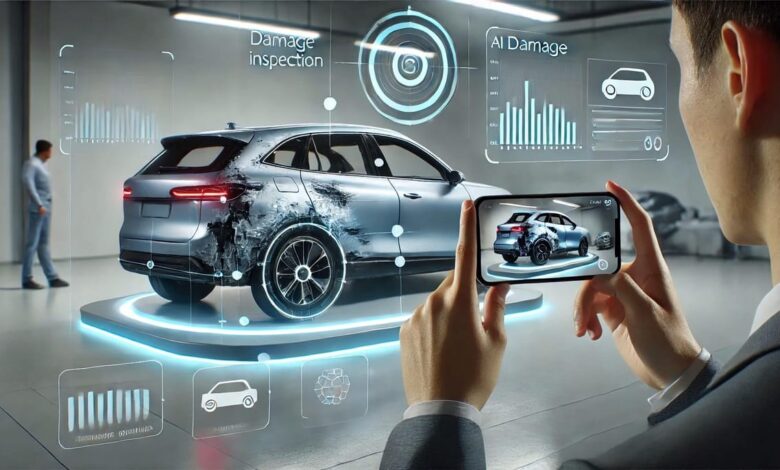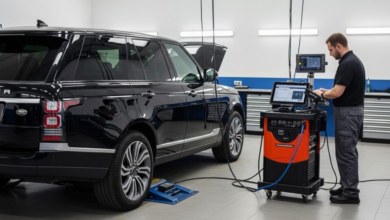Use-cases and the impact on car inspection automation that use AI: car rental players

The relationship between car rental businesses and their customers has always been very strained. On one side, customers believe that car rental companies are money-hungry businesses that will always overcharge customers for their services.
On the other hand, these businesses always have to make a trade-off between dealing either the losses or lowering the service quality in order to relieve themselves. Finding a balance that satisfies both the customer and the business can be a bit of a challenge.
However, thanks to advancements in tech and AI, some of these problems can be addressed, working as a great solution to bridge the gap. One such solution that seems to be working well is the automation of the car inspection process. This is a very crucial step for any car rental business, and using technology to make this process a lot easier, efficient, and transparent can result in benefits for both the businesses as well as customers.
This article explores the different pain points involved in car inspections during the rental process and how automating this process can solve numerous problems for both customers and rental companies.
Challenges Involved in Manual Car Inspections
A car inspection before renting out a vehicle is crucial because it not only ensures that the vehicle is safe to be driven but also helps reduce maintenance costs and allows businesses to charge customers fairly. However, inspecting each car manually has its own set of challenges:

Extensive Manual Effort and Documentation
Traditional inspections often need a lot of paperwork and time that has to be given by the staff to document each vehicle’s condition. Every scratch, dent and interior detail needs to be recorded, creating an enormous administrative burden, particularly for rental operations managing large fleets.
This traditional way documentation not only takes time but also results in a ton of inconsistencies when it comes to maintaining details and records. For rental companies processing hundreds of vehicles daily, this represents a substantial operational challenge.
Human Error and Inconsistent Evaluations
The human element in manual inspections inevitably introduces subjectivity and error into the process. Different staff members may:
- Notice different issues based on their experience level
- Apply varying standards for what constitutes reportable damage
- Document findings inconsistently or incompletely
- Miss damage during rushed inspections at busy times
These inconsistencies not only create operational inefficiencies but can also lead to disputes when customers are charged for damage they believe existed before their rental period.
Time-Consuming and Costly Process
Traditional inspections typically require significant time per vehicle when done thoroughly. This time investment creates several operational problems:
- An increase in the waiting time for customers during pickup and return
- Reduction in the availability of vehicles as cars remain in the inspection queue
- Staff allocation challenges during peak periods
- Increased labor costs for thorough inspections
These delays directly affect the satisfaction of the customer, as there are times when travellers often face time constraints and have to stay for the lengthy rental processes which can pose as a significant inconvenience.
Poor Customer Experience Due to Delays
The time required for manual inspections often creates bottlenecks in the rental process, particularly during busy periods. Customers frequently experience:
- Long wait times during vehicle pickup
- Extended return processes when they may be rushing to catch flights
- Frustration with the overall rental experience
- Negative impressions that impact brand perception and loyalty
These experience issues can significantly impact customer satisfaction and retention rates.
Trust Deficit Between Customers and Rental Companies
The traditional inspection process increases the problem of trust and loyalty between rental companies and their customers. The subjective nature of manual assessments and inconsistencies in documentation can often create an environment which makes the customers
feel vulnerable when it comes to arbitrary damage claims.
This fundamental trust issue manifests in the following:
- Customers can stress regarding the charges
- Disputes over damage responsibility
- Damaged customer relationships and reduced loyalty
- Negative reviews and reputation impacts
These challenges collectively create significant friction in the rental process, making vehicle inspection a prime candidate for technological innovation.
See also: Tech-Driven Wellness: The Tools Behind Today’s Skincare Trends
How AI is Transforming Vehicle Inspections for Rental Companies
Artificial intelligence in this industry comes with great advantages and promising solutions to these longstanding challenges. By automating the inspection process, rental companies can dramatically improve both operational efficiency and customer experience.

Specialized solutions like those developed by Inspektlabs demonstrate how AI is reshaping vehicle inspections. These systems utilize a well designed process which includes many machine learning algorithms along with computer vision, to analyze vehicle images or videos, automatically detecting and documenting damage with remarkable accuracy.
Key Benefits of AI-Powered Vehicle Inspections
Significant Time and Effort Reduction
AI-powered inspection systems transform a process that traditionally requires hours into one that can be completed in just a few minutes.
This efficiency comes from:
- Automated damage detection that eliminates manual examination
- Instant report generation without manual documentation
- Consistent assessment criteria applied uniformly across all vehicles
- Simultaneous analysis of multiple vehicle aspects
This time savings directly impact operations by reducing customer wait times, improving vehicle turnaround, and allowing staff to focus on higher-value customer service activities.
Enhanced Customer Experience
Automation significantly improves the rental experience by:
- Reducing wait times during pickup and return
- Creating more transparent, objective assessment processes
- Providing clear, detailed documentation that both parties can review
- Eliminating subjective human judgment from damage assessment
- Reducing disputes through better documentation
These improvements address one of the most significant pain points in the rental journey, creating a more positive impression of the brand and service.
Reduced Operational Costs
The financial impact of AI inspection is substantial. Solutions like Inspektlabs can reduce per-inspection costs to less than $1, compared to the much higher costs of manual processes when considering staff time and administrative overhead.
This cost reduction comes from:
- Reduced staff time requirements for routine inspections
- Lower administrative costs for documentation
- Fewer dispute resolution expenses
- More efficient vehicle turnaround
- Reduced training requirements
These savings directly impact bottom-line performance while potentially allowing companies to offer more competitive pricing.
Increased Trust and Transparency
AI inspections rebuild trust between rental companies and customers by:
- Providing objective, consistent damage assessment
- Creating clear visual documentation accessible to both parties
- Removing the perception of subjective or biased evaluation
- Giving customers more control and involvement in the process
- Reducing disputes through better documentation
This transparency transforms what was traditionally an adversarial interaction into a more collaborative process based on objective evidence.

Reduced Human Error and Fraud
AI inspection systems significantly reduce opportunities for both human error and intentional fraud:
- Consistent evaluation criteria eliminate assessment variability
- Digital documentation prevents record alteration or loss
- Timestamp and geolocation features verify inspection authenticity
- Comprehensive photographic evidence reduces disputes
- The system flags suspicious patterns that might indicate fraud
With accuracy rates of 90-95%, solutions like Inspektlabs provide more reliable damage detection than typical manual processes, which are vulnerable to oversight and inconsistency
Remote Inspection Capabilities
Beyond the core benefits, AI inspection technologies enable remote assessment capabilities that weren’t previously possible. These systems allow:
- Customers to self-document vehicle condition via smartphone
- Remote assessment without requiring physical staff presence
- Inspection completion outside of business hours
- Verification of vehicle condition at any location
- Digital record maintenance without physical paperwork
This flexibility helps to create new operational possibilities for several rental companies which also includes expanded service locations and improved convenience for customers.
Implementation Considerations
While AI inspection technology offers compelling benefits, successful implementation requires thoughtful planning:
Integration with Existing Systems
For maximum value, AI inspection solutions should integrate with:
- Reservation management systems
- Customer relationship management platforms
- Billing and payment processing
- Fleet management systems
- Maintenance scheduling tools
This integration ensures that inspection data flows seamlessly into relevant operational processes.
Staff Training
Even with automation, staff members need proper training to:
- Understand system capabilities and limitations
- Guide customers through self-service options when applicable
- Review and interpret AI-generated reports
- Handle exception cases appropriately
- Maintain appropriate oversight of automated processes
Effective training ensures that employees embrace rather than resist these new technologies.
Conclusion
As technology advances, we will start seeing more processes being automated to make them more efficient and reduce the subjectivity involved in each process. And as this further improves, the results will start impacting overall customer satisfaction, improve retention, and as a result, will also increase the overall revenue of the company.
With the widespread adoption of AI to automate these processes, it won’t be very long before the early movers have the upper hand and will see an increase in their business thanks to the benefits of implementing tech and AI.




